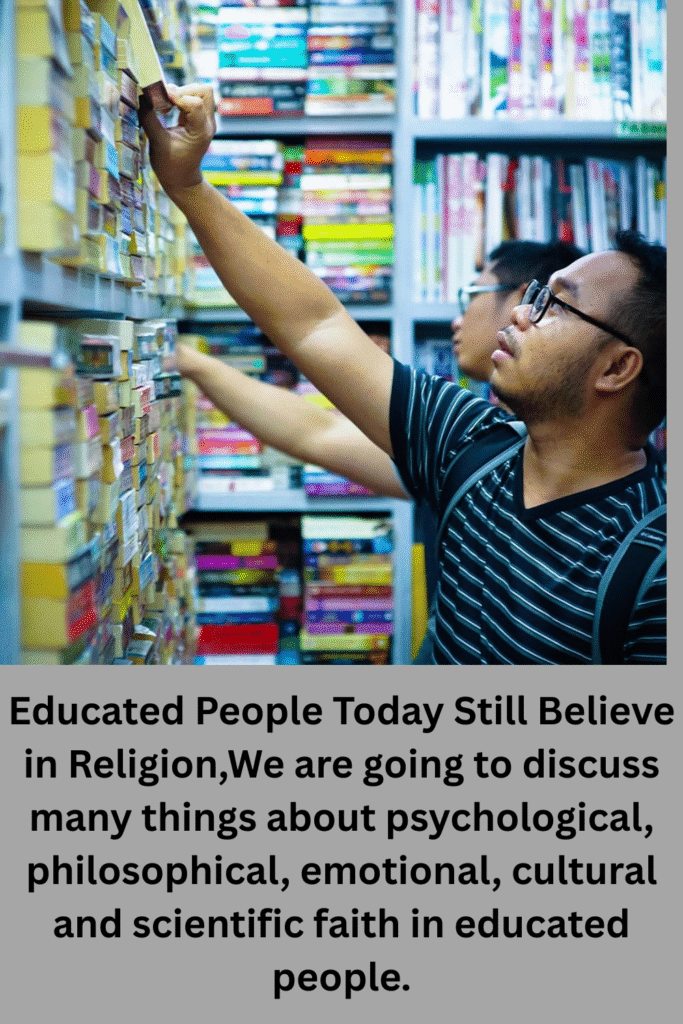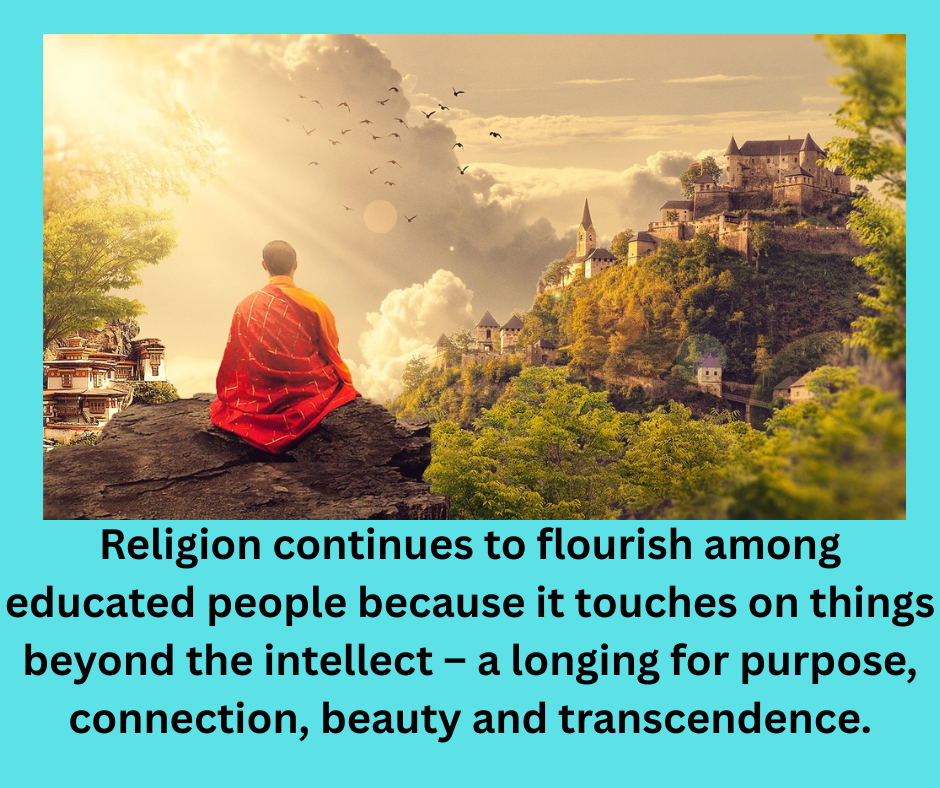Educated People Today Still Believe in Religion,Today, every human being living on Earth is well aware of the many changes that have been brought about by science, such as reaching space. Yet how can you expect an educated person to believe in religion? But the truth is that out of around 8.23 billion people, 5.8 billion people, about 85% still believe in religion.

All the educated people of the world like doctors, lawyers, scientists, engineers, professors even today follow the customs of their religions and also go to any religious or spiritual gathering and regularly pray to their God.
Table of Contents
This raises an important and often debated question:
Today in this article we are going to focus on why educated people have faith in religion and what is the reason for it. Educated People Today Still Believe in Religion,We are going to discuss many things about psychological, philosophical, emotional, cultural and scientific faith in educated people.
Education Doesn’t Erase Existential Questions
In today’s era, education may have provided us with a lot of knowledge like gravity, biology, evolution, quantum mechanics but it can never answer the question of why we have come to this world, what is our purpose, what is the meaning of life, what is the cause of suffering, what happens to man after death.
Educated People Today Still Believe in Religion,Educated people do not believe in religion because they are mad or stupid, but there is a limit to education and science. Science always describes and explains how and religion explains why. Religion provides us with ways of identity, spiritual, emotional solace but science and formal education do not pay attention to such things.
Religion Offers Moral and Ethical Structure
The education provided to us always focuses more on developing academic knowledge, vocational skills, critical thinking but religion on the other hand gives us clear guidelines for moral behavior like we should not steal, help the poor, stay away from pride and greed, respect our parents, be kind to any human being. Educated People Today Still Believe in Religion,For many educated people religion is considered as a reliable basis for making moral decisions. Religion often connects morality with a deep sense of responsibility – not only towards society, but also towards some higher power or spiritual truth.
Faith and Science Are Not Always Opposed
It is often believed that religion and science are contradictory but this is not completely true because there are many scientists in this world who were actually deeply religious. Sir Isaac Newton believed in God and the world’s greatest scientist Albert Einstein often discussed God and the universe as a cosmic mystery. Educated People Today Still Believe in Religion,Francis Collins, a devoted Christian, was the former director of the Human Genome Project. Science tries to teach us how the universe works, while religion helps us discover the meaning of the universe.
Emotional and Psychological Fulfillment
Both intellectual and emotional beings are present in the human community. Education tries to improve our reasoning power towards any question. Education does not end our feelings of love, loss, faith, fear but religion tries to communicate with all these feelings. Prayers provide solace to humans in times of crisis, any religious ritual helps people to celebrate, to get peace, to mourn.

Educated People Today Still Believe in Religion,Meditation motivates humans to do spiritual practices to reduce stress and anxiety. Believing in some power gives us hope in times of trouble. We have seen many learned people becoming religious because faith in some power gives us emotional strength.
Community and Belonging
Any society has an innate need for tradition and belonging to keep people connected, no matter how educated or successful a person may be. Religious places, be it churches, temples, gurudwaras, mosques or domes, provide a deep sense of belonging. Educated People Today Still Believe in Religion,Prayer meetings bring people together, religious festivals create joy and unity, and serve to build shared beliefs and friendships. Beyond employment and intellectual argument, many people turn to religion for purpose and connection.
Cultural and Familial Identity
Religion serves as both a cultural identity and a belief system. Many people grow up in religious families where traditions, values and festivals are passed down through generations. A Hindu, despite having a PhD in physics, can light diyas during Diwali; a Jewish doctor can observe Yom Kippur because it connects him to his ancestors. A Muslim professor can fast during Ramadan to honor his religion and family. They are manifestations of respect, love, and culture. Education does not negate one’s roots; on the contrary, it frequently increases appreciation for them.
Logical and Philosophical Arguments for Belief
Many educated people remain religious because they find philosophical arguments for God or spirituality appealing, such as the cosmological argument that there is a cause for all that exists. The cosmos came into being, hence there must be a cause. Moral arguments that we have objective moral values (for example, murder is wrong). Such values point to a moral lawgiver.
Educated People Today Still Believe in Religion,Fine-tuning arguments that the physical constants of the universe are so precise that life could not exist without fine-tuning – which suggests an intelligent design. We cannot take this type of argument as evidence, but many rational people find it logically persuasive. For them, faith is not blind. It is built on a combination of reasoning and actual experience.
The Limits of Rationalism
His idea that logic alone can explain everything has its limitations. It cannot explain so many things: the depth of love within human beings, the beauty of music or art, the mystery of consciousness, the sudden courage a mother has to protect her child, the peace felt during silent prayer. Many wise men also believe that not everything valuable in life can be measured or explained. Religion often offers insight into these deeper layers of existence.
Personal Experiences and Transformations
We can understand why so many educated people remain religious by the fact that their personal life experiences are one of the main reasons. Reason may shape faith, but experience strengthens it. A scientist may experience the divine presence after a personal tragedy.
A lawyer may find inner peace through prayer after years of stress. A university professor may have a spiritual awakening during meditation. These experiences are often extremely personal and deeply transformative. They may defy scientific analysis, but to the person experiencing them they seem more real than anything.
Religion Adapts with Time
Some critics now hold that religion is outdated. But the truth is that religions continue to evolve. Modern religious leaders, scholars, and institutions increasingly support gender equality, advocate for climate change measures, embrace inter-religious dialogue, and accept scientific theories such as evolution and the Big Bang. This adaptability enables many educated believers to remain true to their faith without abandoning reason or modern values.
The Rise of “Spiritual but Not Religious”
Nowadays many educated people are turning to spirituality rather than traditional religion. They are found to meditate daily, believe in karma or reincarnation, explore yoga, meditation or energy healing, study mystical texts from various traditions, etc. Although they may reject religious institutions, their spiritual curiosity shows that even the most educated people seek something beyond the material world.
Conclusion:
The assumption that religion is for the uneducated is nothing more than a misconception, an oversimplification of the human experience. In fact, faith and education serve different purposes. Education develops the mind. Religion nourishes the soul. Educated People Today Still Believe in Religion,The most educated people in history, from ancient philosophers like Plato and Confucius to modern scientists like Einstein and Collins – have grappled with questions of God, meaning and morality.
For many, belief in religion is not a refutation of science or intellect, but a fulfillment of their spiritual and philosophical journey. Religion continues to flourish among educated people because it touches on things beyond the intellect – a longing for purpose, connection, beauty and transcendence.